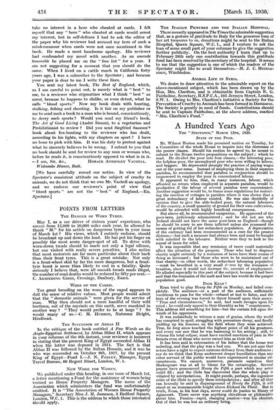A Hunched Years Ago
THE " SPECTATOR," MARCH 13.ra, 1830. STATE OF THE POOR.
Mr. Wilmot Horton made his promised motion on Tuesday, for a Committee of the whole House to inquire into the distresses of the poorer classes. Should his motion be agreed to, he meant to submit to the House twelve propositions on the subject ; which he read. He divided the poor into four classes,—the labouring poor, the helpless poor, the unemployed poor who were willing to labour, and beggars. He deprecated strongly the practice of paying wages out of the poor-rates. Instead of employing them in their separate parishes, he recommended that parishes in conjunction should be empowered to employ the poor in concentrated labour. - It appeared to -him, that, in many instances, labour, which afforded no return when employed in separate parishes, would be productive if the labour of several parishes were concentrated. Another suggestion would be, to frame some regulations for restrict- ing the erection of cottages in parishes where it was shown that a great redundancy of labour existed. He was also decidedly of opinion that to give the able-bodied poor, the natural labourers of the country, a small quantity of ground for their own cultivation, would be attended with highly beneficial consequences. • But above all, he recommended emigration. He approved of the poor-laws, judiciously administered ; and he did not see why Ireland should not have the same poor-laws as England—though he should be sorry to see them inflicted unless she possessed the means of getting rid of her redundant population. A depreciation of the currency had been recommended as a cure for the present distress,;—but such a measure had always been and must be fraught with mischief to the labourer. Neither were they to look to the repeal of taxes for relief. It was impossible that any remission of taxes could materially affect the situation of the paupers. Those who had to dispense charity might certainly by a remission of taxes have their means of doing so increased ; but those who were to be maintained out of that charity—in other words, the redundant labouring population —must be benefited in a very small degree by the remission of taxation, since it would not increase the amount of employment. He alluded especially to this part of the subject, because it had been said that the remission of the malt and beer tax would do the pauper population good.
Poox KEAN Kean tried to play Henry the Fifth on MondaY, and failed com- pletely. The audience—or a part of the audience, sufficiently vociferous to pass for the whole—refused at last to listen, and the hero of the evening was forced to throw himself upon their mercy. " Time and circumstances," he said, had made ravages upon his mind ; he could only appeal to their liberality as his " countrymen." This address did something for him—but the curtain fell upon the wrath of his opponents.
It was melancholy to witness a man of genius, whom the world has conspired to spoil, struggling with premature decay, and finally yielding up his honours on the field where they were achieved. True, he long since touched the highest point of all his greatness, and every one saw that he was hastening to his setting ; still, to witness his total eclipse, must have excited emotions of pain in the breasts even of those who never owned him as their idol.
It has been said in extenuation of his failure that the house was unfeeling, and that the play was a bad one. We are not sure that actors have a right to expect extreme delicacy from their audiences ; nor do wo think that Kean underwent deeper humiliation than any other servant of the public would have experienced in similar cir- cumstances. We cannot, moreover, persuade ourselves that Shakespeare was at all to blame for the catastrophe. Several papers have pronounced Henry the Fifth a part which any actor could fill ; and the Globe has discovered that the whole play is vitiated by interpolations. - It might puzzle, perhaps, the ingenious critic of the. Globe to specify these interpolations ; and after all that can honestly, be said in disparagement of Henry the Fifth, it will stand at an immeasurable height above Richard the Third. But in truth, Kean, in his beet days, never could do justice to Henry of Agincourt. There never was anything chivalrous or philosophic about him. Passion—rapid, changing passion—was his element. Out of that he was but an ordinary being.




















































 Previous page
Previous page